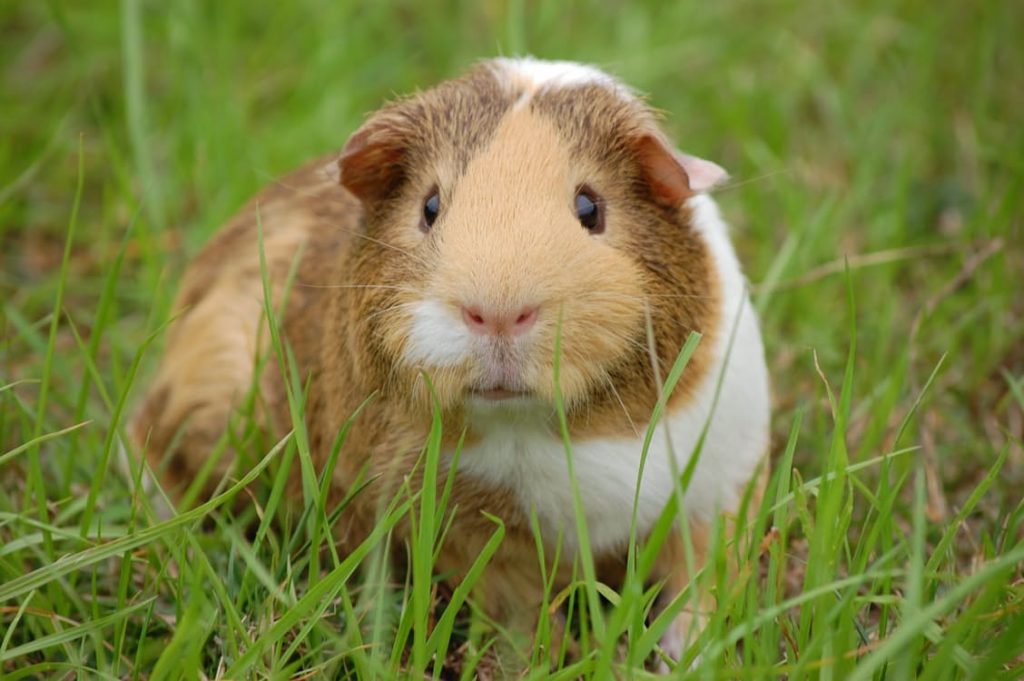Originating from South America, guinea pigs, or cavies, to give them their proper name, are wonderfully intelligent and friendly creatures when handled properly. Although there are 8 species of guinea pig, only one, the domestic cavy, is suitable to keep as a pet.

Because guinea pigs live for anything between four and eight years, their care is a long-term commitment. Guinea pigs like to have company so you can keep a group or a pair. It’s best if these are same sex. But if you’re keeping a male and a female together, make sure the male is neutered for obvious reasons!
Where best to keep your guinea pig?
You can keep your guinea pigs indoors or out, but because they have very sensitive hearing, unless your home is quiet, they are usually happier outdoors.
Keep your pet in a roomy wooden hutch and run that’s is safe from predators. Make sure the hutch has a separate area where the guinea pigs can have a siesta – they love peace and quiet. Place the hutch out of direct sunlight and where there are no draughts. And whatever you do, don’t keep your pet in the garage, as fumes from cars and petrol lawnmowers can kill them.
Guinea Pig Bedding
There all sorts of bedding options. Some people use hardwood shavings, or paper-based bedding, or even fleece, but the best bedding to use is hay. This is because it makes up the biggest part of a guinea pig’s diet. So, try to find someone who can supply you with hay. If you love your pets, then give them the best! And be sure to provide extra bedding during the cold winter months.
Food for your cavies
Guinea pigs are grazing animals, so you should always make sure they have a good supply of top quality, bagged, hay to keep their digestive systems working properly. You can also feed them a small amount of guinea pig mix. Fruit and vegetables – a great source of vitamin C – should also be included in their diet. This is because guinea pigs lack the enzyme to produce this themselves. Pieces of peeled orange, melons and dark green, leafy vegetables like broccoli, spinach, cabbage and kale are all good vitamin sources.
Oh, and never, ever feed your pets lettuce as this causes diarrhoea. Hay and vegetables are a very important food source so don’t just feed them guinea pet mix. And be careful not to overfeed your guinea pig as they can easily become obese.
Health matters
A healthy guinea pig should look alert, with bright eyes and a shiny coat. A common problem in guinea pigs is bumblefoot. This is caused by a bacterial infection (often because of dirty bedding), and makes the guinea pig’s feet swell.
Eye problems are another problem, so it is important to use dust-free bedding. Skin issues like mange are also occur regularly in guinea pigs. It’s also important to keep your guinea pigs groomed. The long-haired varieties need daily grooming, otherwise their coats can quickly become matted and messy.
Enough Exercise
Guinea pigs like to run about so make sure their hutches are at least 1.2m long and 60cm wide. There should also be a run so they can graze. You can let them have exercise indoors but you need to closely supervise this. Keep the doors closed and make sure your cats and dogs are not around. Toys don’t usually get a reaction from guinea pigs but some enjoy exploring cardboard boxes and running through pipes or tubes.
Good Company
Your pet should only have other guinea pigs as companions. DO NOT KEEP THEM WITH RABBITS as they’ll be bullied and pushed around. The best combination is a pair, or a small group of the same sex guinea pigs.
Proper Handling
Guinea pigs are friendly and can be handled once they’ve got used to their surroundings. It’s best to use both hands to pick up a guinea pig. Gently place one hand across their shoulders and tuck your thumb behind the shoulder, then wrap your fingers around their ribs. Hold tightly but without squeezing. Keep the guinea pig close to your body or let them sit on your lap.
Perfect Pets
Guinea pigs make very good pets for the young as well as the old. They’re active during the day and communicate by making different noises. They coo when happy and content, squeak when frightened, anticipating the arrival of food! They need company and will be unhappy if left alone in a hutch.
These are gentle animals, but as they can live to around seven years, they might outlive your child’s interest, so it’s important you share an interest. As with all relatively defenceless pets, you need to ensure that your children provide the proper care and attention.
This article was written by Dakota Murphey, independent content writer and small rodent lover.





